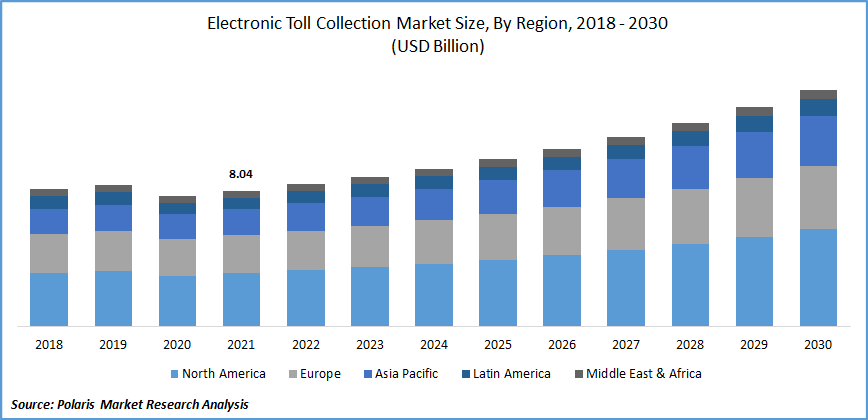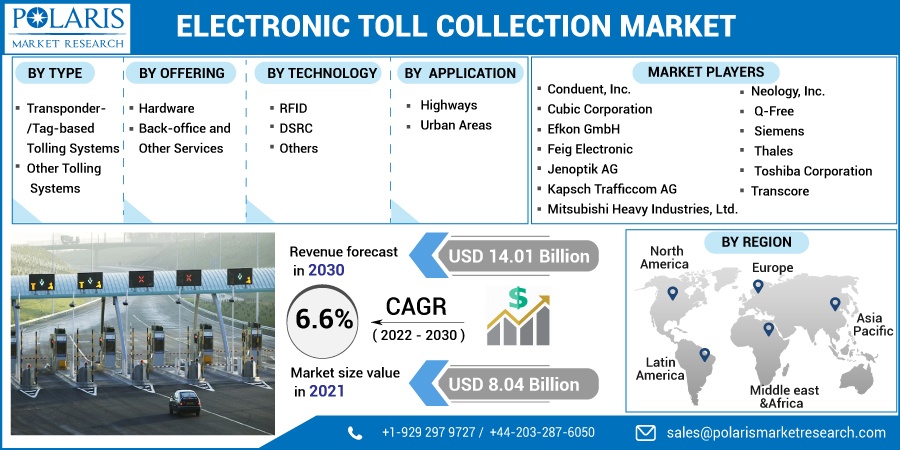
Electronic Toll Collection Market Share, Size, Trends, Industry Analysis Report, By Type (Transponder-/Tag-based Tolling Systems, Other Tolling Systems); By Technology (RFID, DSRC, Others); By Offering; By Application; By Region; Segment Forecast, 2022 - 2030
- Published Date:Jul-2022
- Pages: 101
- Format: PDF
- Report ID: PM2527
- Base Year: 2021
- Historical Data: 2018-2020
Report Summary
The global electronic toll collection market was valued at USD 8.04 billion in 2021 and is expected to grow at a CAGR of 6.6% during the forecast period. With the proliferation of digital technologies, there is increased adoption of electronic toll collection technology over the manual toll collection system, which is anticipated to stimulate the growth of the market.

Know more about this report: Request for sample pages
The demand for the market is attributed to the rising traffic congestion issues, which accelerate the need for this system that assist in improving the speed and efficiency of traffic flow and saving drivers time. This system can be used to electronically charge a toll to an established customer’s account. Without any checking or ignorance of safety rules and regulations, an electronic toll system allows vehicles to pass through.
The emergence of the Covid-19 pandemic had severely impacted the electronic toll collection market. Worldwide lockdowns and stringent rules and regulations across the globe restricted the movement of the people, which reduced the demand for transportation. Other economic activities were badly affected owing to the disruption in the supply chain.
The manufacturers were compelled to close their production sites in order to curb the spread of the disease as well as the decreased demand for goods and services, resulting in reduced transportation and logistics services. In addition, several electronic toll collection system providers are focusing on acquisition, partnerships, and collaborations strategy in order to bring new system solutions.
 Know more about this report: Request for sample pages
Know more about this report: Request for sample pages
Industry Dynamics
Growth Drivers
The rising traveling habit of individuals, increasing leisure activities as well as increasing lane of the vehicle on toll plazas is likely to pave the way for higher demand for the systems, which in turn, is anticipated to push the growth of the market over the forecast period.
Furthermore, the electronic toll collection market is likely to be fueled by the increasing demand for hassle-free toll collection and toll monitoring. ETC is a very fast and efficient mode for toll charge collection as it saves a lot of time for commuters passing through the toll plazas.
In addition, the demand for electronic toll collection systems is associated with several benefits such as reduced traffic congestion, enhanced cash handling, efficient data collection, reduction in emission control and air pollution, saving time and fuel, and many others.
Report Segmentation
The market is primarily segmented on the basis of type, offering, technology, application, and region.
|
By Type |
By Offering |
By Technology |
By Application |
By Region |
|
|
|
|
|
Know more about this report: Request for sample pages
Transponder-/tag-based tolling system to account for higher growth rate during the forecast period
The transponder-/tag-based tolling systems are widely used for vehicle identification, and they automatically collect tolls levied against vehicles on HOV lanes, toll motorways, toll bridges, and toll tunnels. These are more effective options than toll booths, where drivers must stop over it and physically pay the toll with cash or a credit card.
Highways segment is expected to account for a higher growth rate during the forecast period
The implementation of the systems to quickly complete financial transactions at tolls and lessen traffic congestion on highways is anticipated to be prompted by the growth of transportation infrastructure. For instance, the Indian government plans to build 65,000 km of national highways by 2022 with a budget of USD 741.5 billion.
RFID segment is expected to grow at a significant rate during the forecast period
The demand for the market is expected to be driven by the increased use of RFID technologies across the globe. In order to automatically deduct toll amounts, RFID tags are scanned by an RFID mounted on an electronic toll collection system. The technology makes it easy and simple for car owners and toll authorities to share payment information. As a result, there is less manual work, and the process is more transparent.
Geographic Overview
North America accounted for the largest revenue share in the global market in 2021. The regional trend toward digital transformation is anticipated to accelerate the market for overall growth. Additionally, the increase in car ownership more than in any other region across the globe creates a significant opportunity for the expansion of the electronic toll collection market.
Moreover, Asia Pacific is anticipated to grow at a significant CAGR during the forecast period. The market outlook is expected to be positively impacted by the rapidly rising vehicle demand and production in developing and developed countries, as well as the shift in customer preferences toward smart vehicles.
Competitive Insight
Some of the major players operating in the global market include Conduent, Inc., Cubic Corporation, Efkon GmbH, Feig Electronic, Jenoptik AG, Kapsch Trafficcom AG, Mitsubishi Heavy Industries, Ltd., Neology, Inc., Q-Free, Raytheon Technologies Corporation, Siemens, Star Systems International Ltd., Thales, Toshiba Corporation, and Transcore.
Recent Developments
In November 2021, SiVA, a Grupo Marhnos company, partnered with Thales in order to revolutionize toll collection in Guatemala through bringing Thales’s well-known PITZ® (Peage Intelligent Transport Zero) electronic toll collection system to the country’s vital Palin-Escuintla toll road corridor.
In October 2019, TransCore introduced a new product that enables RVers to travel across the country using only one transponder to pay tolls electronically without stopping at a toll booth. RV Toll Pass was made to change the way RVers travel across the country through different tolling jurisdictions.
Electronic Toll Collection Market Report Scope
|
Report Attributes |
Details |
|
Market size value in 2021 |
USD 8.04 Billion |
|
Revenue forecast in 2030 |
USD 14.01 Billion |
|
CAGR |
6.6% from 2022 - 2030 |
|
Base year |
2021 |
|
Historical data |
2018 - 2020 |
|
Forecast period |
2022 - 2030 |
|
Quantitative units |
Revenue in USD Billion and CAGR from 2022 to 2030 |
|
Segments covered |
By Type, By Offering, By Technology, By Application, By Region |
|
Regional scope |
North America, Europe, Asia Pacific, Latin America, Middle East & Africa |
|
Key companies |
Conduent, Inc., Cubic Corporation, Efkon GmbH, Feig Electronic, Jenoptik AG, Kapsch Trafficcom AG, Mitsubishi Heavy Industries, Ltd., Neology, Inc., Q-Free, Raytheon Technologies Corporation, Siemens, Star Systems International Ltd., Thales, Toshiba Corporation, and Transcore |
License and Pricing
Purchase Report Sections
- Regional analysis
- Segmentation analysis
- Industry outlook
- Competitive landscape
Connect with experts
Suggested Report
- Floor Grinding Tools Market Share, Size, Trends, Industry Analysis Report, 2022 - 2030
- High-performance Liquid Chromatography Market Share, Size, Trends, Industry Analysis Report, 2022 - 2030
- Quillaia Extracts Market Share, Size, Trends, Industry Analysis Report, 2021 - 2028
- Intelligent Traffic Management System Market Share, Size, Trends, Industry Analysis Report, 2022 - 2030
- Patient-controlled Analgesic Pumps Market Share, Size, Trends, Industry Analysis Report, 2021 - 2028

